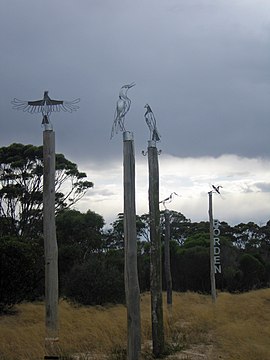| Borden Western Australia | |
|---|---|
 Welcome to Borden | |
 | |
| Coordinates | 34°04′26″S 118°15′40″E / 34.074°S 118.261°E |
| Population | 37 (SAL 2021)[1] |
| Established | 1912 |
| Postcode(s) | 6338 |
| Area | 0.8 km2 (0.31 sq mi) |
| Location | |
| LGA(s) | Shire of Gnowangerup |
| State electorate(s) | Roe |
| Federal division(s) | O'Connor |
Borden is a small town and locality in the Shire of Gnowangerup, Great Southern region of Western Australia.[2][3] The town is located 325 kilometres (202 mi) south east of the state capital, Perth Western Australia, and 111 kilometres (69 mi) north of Albany on Chester Pass Road. At the 2006 census, Borden and the surrounding area had a population of 164.[4]
The town was established as a siding on the Ongerup branch railway between Gnowangerup and Ongerup and is named after Canadian Prime Minister Robert Laird Borden.[5] The stop after Borden, Laurier, was also named after a Canadian Prime Minister, Wilfrid Laurier.[6] The railway opened for business on 6 January 1913 and closed on 13 October 1957.[7]
The area near Paper Collar Creek near where the town stands was a meeting point for sandalwood cutters in the 1840s for when they used to head to the port at Albany.[8]
In 1916, 250 acres (100 ha) of land was set aside for a townsite. Although the site had not been surveyed J.G. Jenkins had already erected the first building containing dwelling, dining, refreshment and assembly rooms. Another man, J. Copeland was also constructing a building at this time. A telephone connection with Gnowangerup had also been established and mail was being received twice a week by train.[9]
The local agricultural hall, constructed of jarrah and cast iron, was opened in 1928 by the Minister of Lands, Michael H. Troy. Local members H. Stewart and Charles Wittenoom were also present.[10]
The main industry in town is wheat farming, with the town being a Cooperative Bulk Handling receival site.[11] The receival bins are able to handle 170,000 tonnes (167,315 long tons) of grain during harvest times.[8] In 2017 the receival site was inundated with floodwaters following a heavy rain event.[12] The harvest had been a new record so that large amounts of grain were stored in overflow bins.[13]
- ^ Australian Bureau of Statistics (28 June 2022). "Borden (suburb and locality)". Australian Census 2021 QuickStats. Retrieved 28 June 2022.
- ^ "SLIP Map". maps.slip.wa.gov.au. Landgate. Retrieved 15 October 2024.
- ^ "NationalMap". nationalmap.gov.au. Geoscience Australia. Retrieved 15 October 2024.
- ^ Australian Bureau of Statistics (25 October 2007). "Borden (State Suburb)". 2006 Census QuickStats. Retrieved 1 July 2008.
- ^ "Albany Gateway - Borden". Archived from the original on 16 October 2007. Retrieved 30 June 2008.
- ^ "History of country town names – B". Western Australian Land Information Authority. Archived from the original on 14 March 2022. Retrieved 14 October 2024.
- ^ The Ongerup Branch Milne, Rod Australian Railway Historical Society Bulletin, May, 2002 pp163-170
- ^ a b "Borden". Albany Gateway. Archived from the original on 4 May 2019. Retrieved 29 December 2017.
- ^ "Borden". Gnowangerup Star And Tambellup-Ongerup Gazette. Vol. 1, no. 28. Western Australia. 12 February 1916. p. 2. Retrieved 29 December 2017 – via National Library of Australia.
- ^ "Borden's New Hall". Albany Advertiser. Western Australia: National Library of Australia. 17 July 1928. p. 1. Retrieved 1 October 2013.
- ^ "CBH Receival Sites - Contact Details" (PDF). 2010. Archived from the original (PDF) on 18 March 2012. Retrieved 31 March 2013.
- ^ "Floodwaters inundated CBH's grain receival site at Borden". Australian Broadcasting Corporation. 14 February 2017. Retrieved 29 December 2017.
- ^ Nick Butterly. "Floods hit CBH grain shipments at crucial stage of season". The West Australian. Seven West Media.
